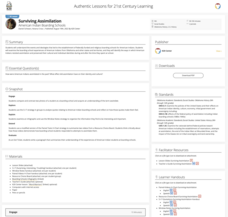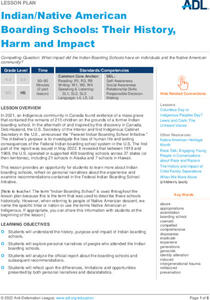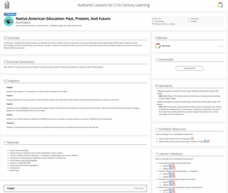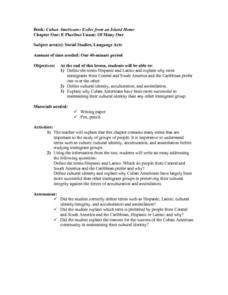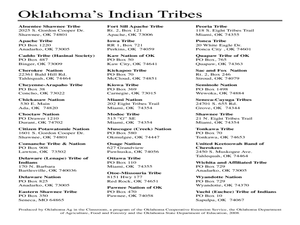Annenberg Foundation
Becoming Visible
The television and interstate highways both came of age in 1950s America. Scholars use film, text, and discussion to explore how these and other cultural icons shaped the literature of the time. Pupils also create a family history...
K20 LEARN
Surviving Assimilation: American Indian Boarding Schools
The boarding school era is "a history that all of us need to know about," says Secretary of the Interior Deb Haaland. Here's a lesson plan that examines that history. High schoolers examine video interviews of Native Americans who detail...
Anti-Defamation League
Indian/Native American Boarding Schools: Their History, Harm and Impact
Encultureate, assimilate, or eliminate? The 2021 discovery of a mass grave of over 200 children on the site of a former Canadian Indian Boarding school led to the creation of the Federal Indian Boarding School Initiative. High schoolers...
K20 LEARN
Native American Education - Past, Present, and Future: Assimilation
To understand the history of Native American education, high schoolers examine the record of young scholars who attended the Carlisle Indian School from 1879-1918. They also examine sources that contain information about indigenous...
Anti-Defamation League
Columbus Day or Indigenous Peoples Day?
"Columbus Day"? Indigenous Peoples' Day"? "Native Americans' Day"? The controversy over what to call the federal holiday celebrated on the second Monday in October is the focus of a lesson that asks high schoolers to consider various...
DocsTeach
Petition Against Annexation of Hawaii
Stop westward expansion! The quick activity delves into the past to understand the petition against the annexation of Hawaii by the United States. Scholars analyze the petition to understand why native Hawaiians were against the...
Smithsonian Institution
Re-Segregation of American Schools: Re-Segregation
Examine the re-segregation of public schools in a thought-provoking resource. Young scholars read articles and primary sources, complete worksheets, and watch a video to explore the idea that desegregation made schools more segregated....
Smithsonian Institution
Resistance to School Desegregation: The Boston Busing Crisis
Despite how it sounds, Boston's busing crisis wasn't a transportation problem. Academics address the problems faced by African Americans following school desegregation and the struggle to receive equal educational opportunities. Scholars...
Smithsonian Institution
Borders within the United States: Indian Boarding Schools and Assimilation
Native American Nations ... sovereign entities or removable tribes? A thought-provoking instructional activity explores the relationship between Native American tribes and the United States, including forced assimilation and removal from...
DocsTeach
Assimilation of American Indians
Imagine being forced to give up your culture and then being graded on how well you complied with orders to do so. Documents show young historians the price indigenous peoples paid as a result of the Dawes Act, which was essentially a...
DocsTeach
Assimilation and the Native People of Metlakahtla, Alaska
Fitting in to a dominant culture comes at a price—especially for native peoples. Class members consider this concept using a photo matching game of indigenous people in Alaska. Discussion questions help them consider to what extent these...
Stanford University
Carlisle Indian Industrial School
How do policies aimed to help actually hurt? Native American boarding schools—an attempt at assimilating children of indigenous tribes into white culture—had a shattering effect on those who attended. With primary sources, including...
PBS
Stereotypes vs. Statistics (Grades 9-12)
What is a common stereotype people may think about you; is it true? Using a thought-provoking instructional activity, high schoolers analyze common stereotypes of the Latino-American population versus statistical data. Scholars review...
PBS
Stereotypes vs. Statistics (Grades 4-8)
Stereotypes can be painful if they are used to discriminate against others. Statistics, however, can be helpful in dispelling myths propagated by stereotypes. Using a thoughtful lesson plan, scholars complete graphic organizers and...
Smithsonian Institution
Affirmation, Assimilation, and Acculturation: Middle School
Latin American culture is deeply embedded in American culture as a whole. From the Latin rock scene in San Francisco to the hip-hop world of New York, Latin American artists have influenced every genre of modern music. Learn about the...
Museum of Tolerance
Disenfranchised People of the New Nation
Why are some immigrant groups in the United States embraced while others become disenfranchised? To answer this question, teams investigate why groups emigrated to the US, why some of these these peoples were disenfranchised, and their...
Curated OER
Jacksonian America and the Indian Removal Act of 1830
Students utilize primary sources to explore the national climate concerning Native American Indians during the Andrew Jackson administration. They are presented with opinions for and against the Indian Removial Act of 1830 as they...
Curated OER
Cuban Americans: Exiles from an Island Home
Middle schoolers define the terms Hispanic and Latino and explain why most immigrants from Central and South America and teh Caribbean prefer one over the other. They define cultural identity, acculturation, and assimilation. Students...
Foreign Policy Research Institute
European Muslim Unemployment
Economics students explore the impact of immigration on the economy, along with other aspects of the Muslim migration into Europe. While the lesson may be effective, the PowerPoint on which it is based is not accessible. Nevertheless,...
Curated OER
Describe Environmental Interrelationships
Students describe environmental interrelationships using list of criteria. They are able to explain organism interaction, based on definitions provided. Also, students can use references and worksheets, to describe effects of pollution...
Curated OER
Eng 213 Final Exam
Use this presentation in your linguistics class as a review tool, or utilize the concepts within it to frame your curriculum. Covering vowel and consonant rules, morphophonemic spelling systems, and assimilation rules, this slide show...
Curated OER
Plows on the Hunting Grounds
Students will examine and anaylze the assimilation of Native Americans in the US.
Curated OER
19th Century Settlement Houses
Students will take notes on 19th century settlement houses using a four-door book of foldable notes. In this lesson on Settlement Houses, students will analyze the Hull House through a variety of primary sources, then create a list of...
Curated OER
Forced Assimilation
Students identify ways that a society promotes assimilation and examine areas where it still occurs in our present culture. They assess the value of assimilation.



